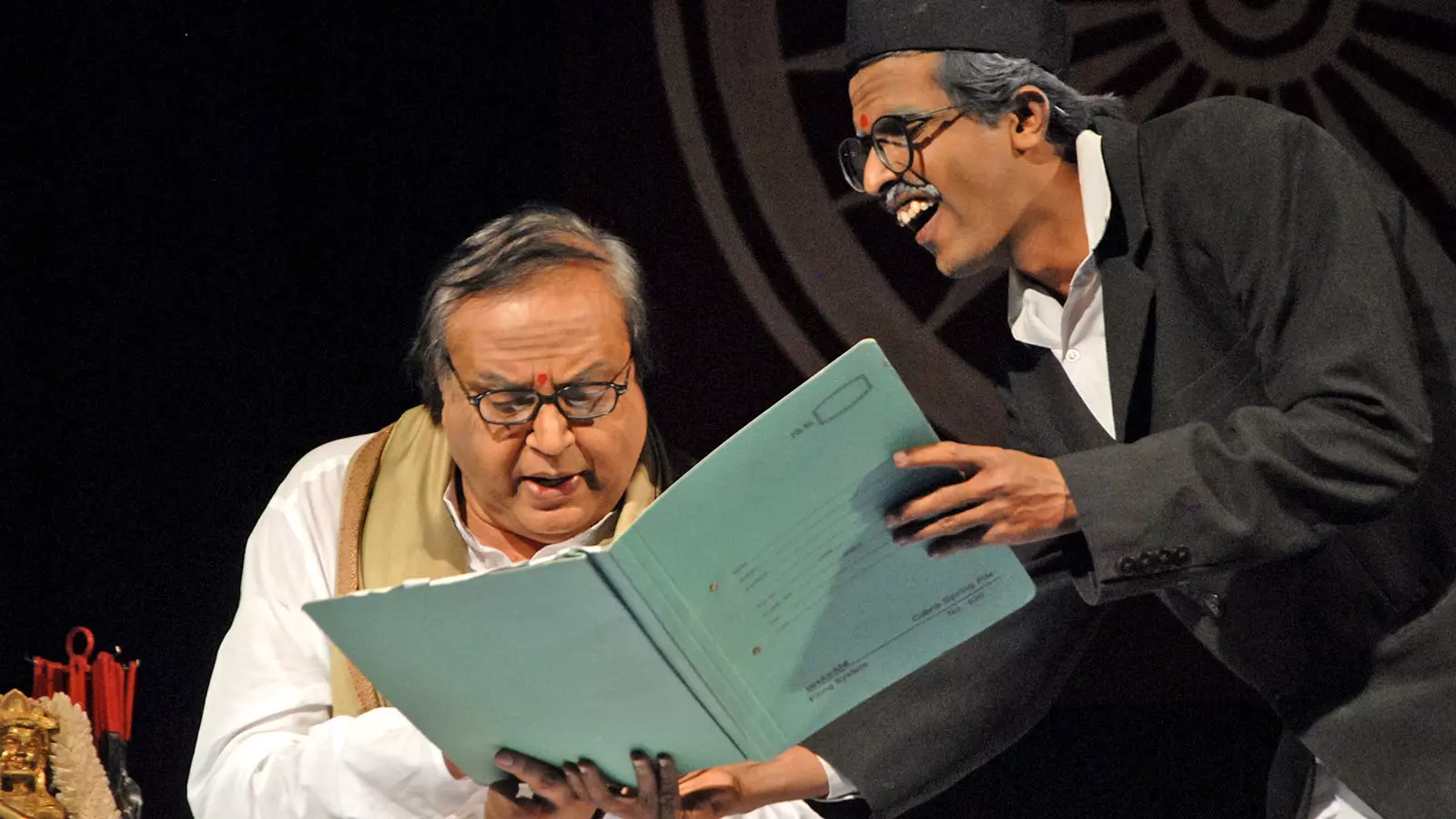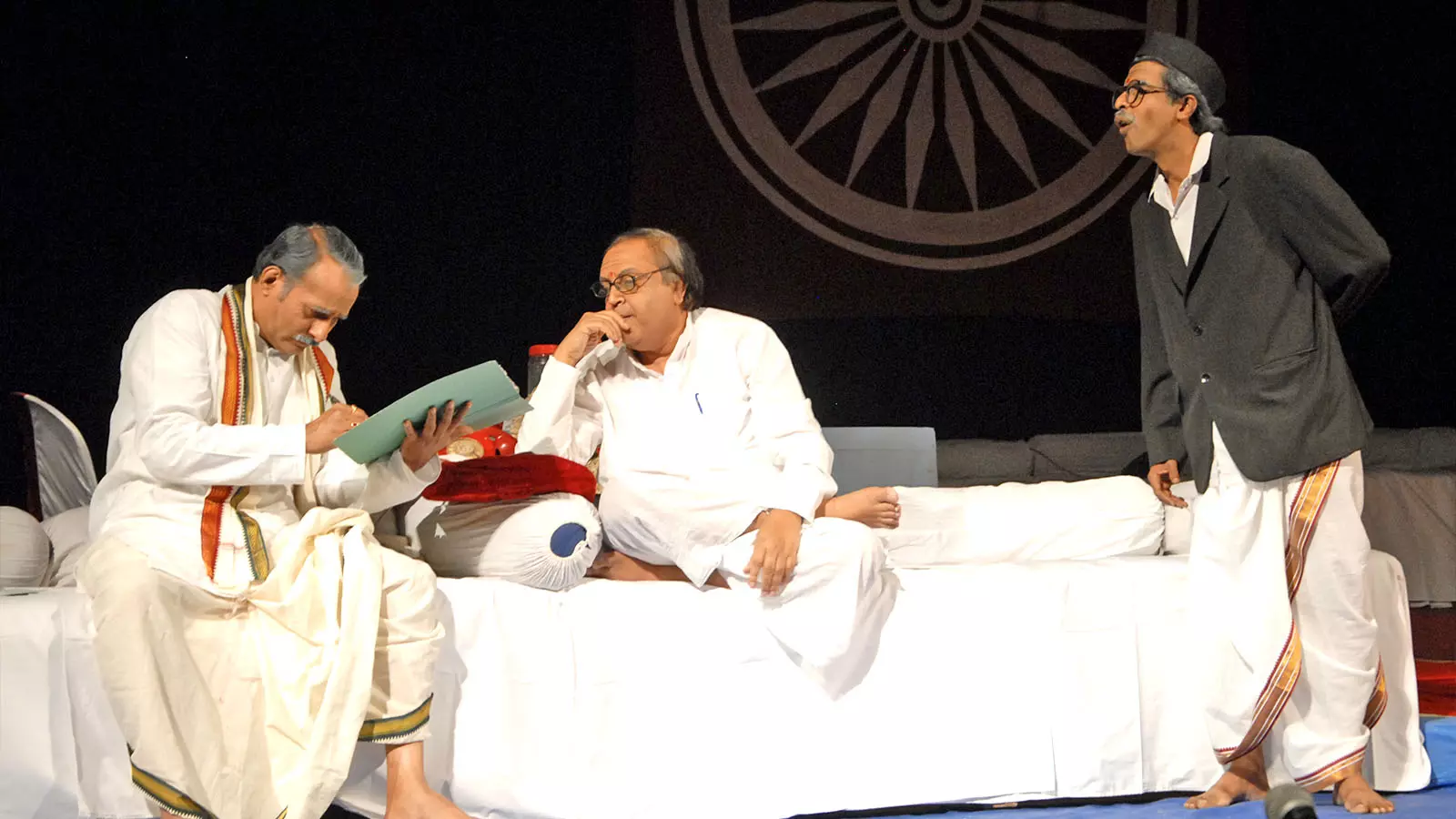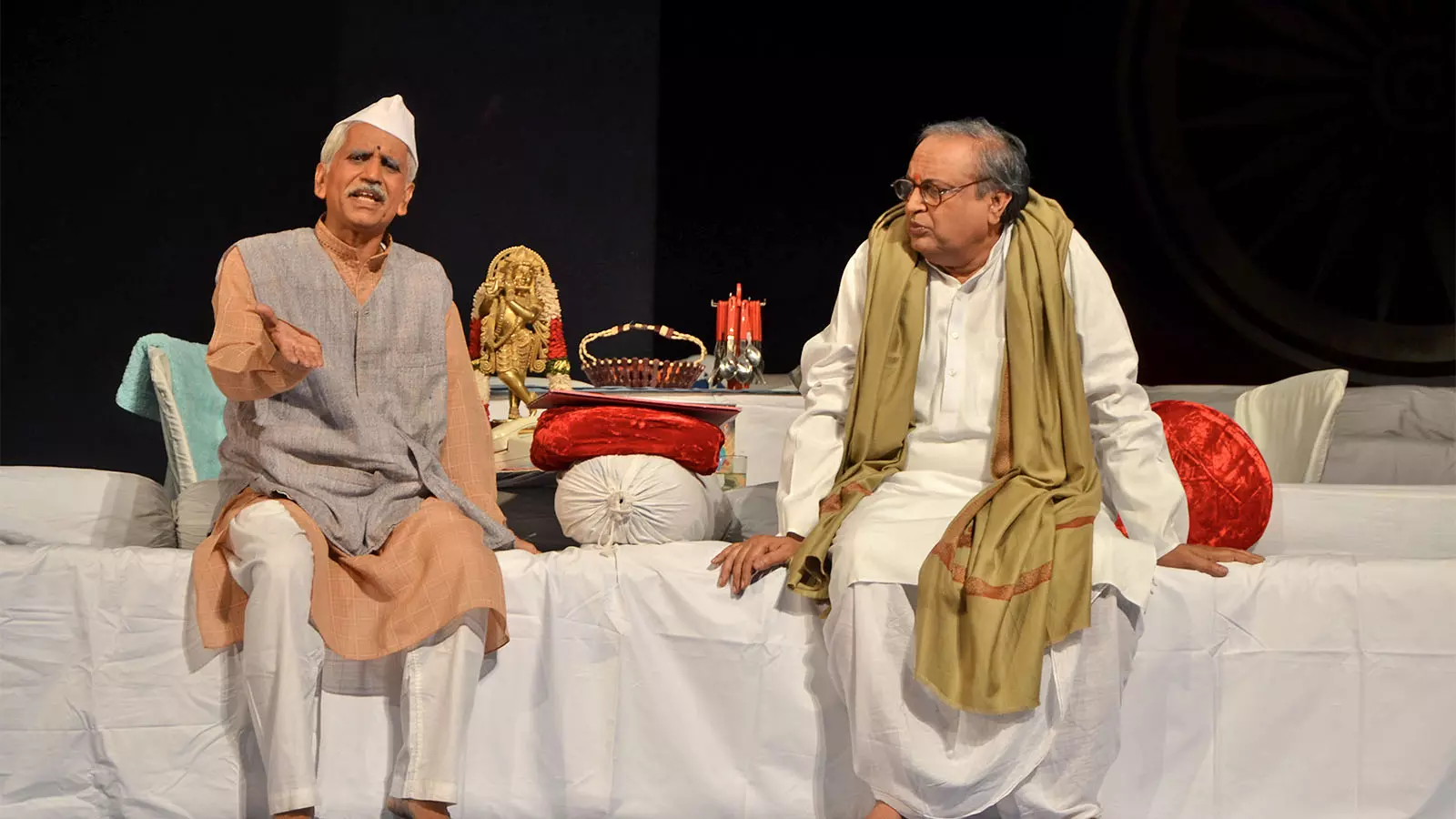
- Home
- India
- World
- Premium
- THE FEDERAL SPECIAL
- Analysis
- States
- Perspective
- Videos
- Sports
- Education
- Entertainment
- Elections
- Features
- Health
- Business
- Series
- In memoriam: Sheikh Mujibur Rahman
- Bishnoi's Men
- NEET TANGLE
- Economy Series
- Earth Day
- Kashmir’s Frozen Turbulence
- India@75
- The legend of Ramjanmabhoomi
- Liberalisation@30
- How to tame a dragon
- Celebrating biodiversity
- Farm Matters
- 50 days of solitude
- Bringing Migrants Home
- Budget 2020
- Jharkhand Votes
- The Federal Investigates
- The Federal Impact
- Vanishing Sand
- Gandhi @ 150
- Andhra Today
- Field report
- Operation Gulmarg
- Pandemic @1 Mn in India
- The Federal Year-End
- The Zero Year
- Science
- Brand studio
- Newsletter
- Elections 2024
- Events
Why Mukhyamantri Chandru will never cease to be Karnataka’s chief minister
On December 4, 1980, when Mukhyamantri (chief minister) was first staged at Samsa open-air theatre, behind Ravindra Kalakshetra, neither director BV Rajaram, nor HN Chandrashekar, an employee of Bangalore University, who essayed the character of Mukhyamantri, imagined that the play will create a record of sorts in the history of amateur theatre of Karnataka and Chandrashekar will become a part...
On December 4, 1980, when Mukhyamantri (chief minister) was first staged at Samsa open-air theatre, behind Ravindra Kalakshetra, neither director BV Rajaram, nor HN Chandrashekar, an employee of Bangalore University, who essayed the character of Mukhyamantri, imagined that the play will create a record of sorts in the history of amateur theatre of Karnataka and Chandrashekar will become a part of history of Kannada theatre, cinema and politics.
Mukhyamantri produced by a five-decade old amateur theatre group ‘Kalagangotri’ (founded in 1971), continues to stage the play even after 44 years and crossed the 800-show mark on December 30, 2023. The play, a political satire, remains relevant even today as not much has changed in India's politics over the past four decades. The play made its mark as a classic and etched an indelible impression on the minds of the people with Chandrashekar’s top-notch acting, BV Rajaram’s direction, but above all because of its content.
Chandru as Mukhyamantri
Honnasandra Narasmihaiah Chandrashekar, who essayed the character of Mukhyamantri in the first play continues to play the part 44 years later. Because of the success of the play, HN Chandrashekar earned a permanent moniker as ‘Mukhyamantri Chandru’. Karnataka has seen over 22 chief ministers in the past seven decades, but Chandru has remained the unbeatable ‘Mukhyamantri of Karnataka’ since 1996. This is because JH Patel, the chief minister of Karnataka from 1996 to 1999, got a gazette notification issued to get Chandru’s name registered as ‘Mukhyamantri Chandru’. Over the past four decades, over 300 artistes essayed various characters in this play, but Chandru is the only artiste who continued to essay the character of Mukhyamantri, with the changing cast. All these years, the play has been staged in various parts of the country and abroad by Kalagangotri.

Because of the success of the play, HN Chandrashekar earned a permanent moniker as ‘Mukhyamantri Chandru’.
Language hasn’t been a barrier for the play. Mukhyamantri, in fact, has been in the same league of Kannada classics and legendary plays such as Hayavadana, Jokumaraswamy Tughlaq, and Sattavara Neralu. It is a play adapted by Ranjit Kapoor from a 1976 novel written by Chanakya Sen, and was translated by TS Lohitashwa into Kannada in late 1970s.
The play is about a Machiavellian power manoeuvre of the Chief Minister of the fictitious Indian state of Udayanchal. Set in a situation of swaying political loyalties, Mukhyamantri follows the protagonist, who is firm on retaining his position, despite attempts by his party president to dethrone him.
Theatre and film actor, TS Lohitashwa, was earlier supposed to essay the role of Chief Minister Krishna Dwaipayana in the play. But as fate would have it, the role was offered to Chandru. “The role was offered to me as my colleague Lohitashwa fell ill. I incorporated my own dialogues, which were not written in the play and it resulted in transforming a serious political satire into a hilarious comedy. However, no one was bothered, as the play was a huge success,” says 71-year old Chandru with a smile spread across his face.
NSD’s Mukhyamantri
Even before Lohitashwa translated the play, Prema Karanth had plans to produce the play for the National School of Drama (NSD). On learning that Kalagangothri was set to stage the play, Prema was irked and questioned BV Rajaram about his theatrical ethics. However, it was BV Karanth, who intervened and cajoled Prema to allow Kalagangothri to stage the play. Later, Prema and Karanth watched the play together and appreciated Chandru’s performance. Over the course of time, even NSD students staged Mukhyamantri. While the 120-minute version of Mukhyamantri staged by Kalagangothri was entertaining, the 180-minute-long NSD production was a serious attempt to look at the political machinations. “Ranjit Kapoor, who adapted the novel to theatre, had also watched both the plays and appreciated our attempt,” said Rajaram.

Chandru says the degradation of politics over the years has contributed to the success of the play.
Mukhyamantri was staged at Samsa open-air theatre from December 4 to 10 in 1980. The play’s publicity happened word of mouth and it was the acting prowess of Chandru because of which the audience started thronging Ravindra Kalakshetra and the play turned into a huge success. “All the shows were full,” recalls Rajaram, who directed the play.
“Even after 44 years, the play is still relevant,” he says. “The play is contemporary because of the title and the plot. Every one of us has an opinion on power politics in this country. Politicians and nauseating politics provide us fodder and keep us engaged, as politics has penetrated in every walk of life. Whenever, wherever we stage the play, people who watch analyse the content from their own perspectives,” he tells The Federal.
According to Chandru, the degradation of politics over the years has contributed to the success of the play. When the play throws light on political machinations, which has an uncanny semblance with present-day politics, the audience instantly connect with it. “It is the simple and straightforward format that is finding an audience-connect. The fact that the play has succeeded without any song and dance testifies that. We are offering the audience something close to their heart,” Chandru says.
During the tenure of Chief Minister R Gundu Rao (1980-1983), many believed that this political satire would be banned. Recalling those days, Chandru says, “When media reported the contemporariness of the play, some people misguided Gundu Rao that Mukhyamantri was aimed at criticising him. Gundu Rao, who had had a certain love for art and culture, asked Kalagangothri to stage the play on the promise that the government would meet its expenditure. Mukhyamantri was staged for Rao in Chowdiah Memorial Hall. After watching the play, Gundu Rao came to the side wing and appreciated the performance.”
“Referring to my performance he said, ‘You just look like Devaraj Urs. Had you met me I would have given you some more tips about the crooked politics we are immersed in. Your play looks pale before the real politics.’ I and Rajaram were relieved from the tension we were carrying. Rao even volunteered to help us if we face problems in staging the play anywhere in Karnataka. He was a good human being,” Chandru adds.
Dr Rajkumar, Ramakrishna Hegde, Deve Gowda and other senior politicians and actors have also watched Mukhyamantri and appreciated the efforts of both Chandru and Rajaram. “They watched the 150th show. After the show Dr Rajkumar, Parvathamma Rajkumar, Hegde and Deve Gowda met me in the green room and praised my performance,” recalls Chandru.
From Mukhyamantri to Simhasana
The success of Mukhyamantri opened the doors of Kannada cinema for Chandru. Chandru has acted in over 500 films in four south Indian languages so far and shared screen with the stalwarts of Kannada cinema, including Dr Rajkumar, Vishnuvardhan, Ambarish, Ananth Nag and others. In his biography Rangavanada Chandra Taare (Moon Star of Theatre) Chandru recalls his experience in his first film Phaniyamma (1983) directed by Prema Karanth, which bagged numerous national and international awards. It is Chandru’s body language and dialogue delivery that earned him a star status in Kannada cinema. “In most films, I donned the role of anti-hero and a comedian which suits my persona. I essayed the role of the protagonist in very few films,” Chandru says, smiling in cinematic style.
“In the late 1970s, I was acting only in experimental films because in those days, theatre artistes were getting opportunities only in parallel or art films as they were made by personalities who were closely associated with theatre. I essayed the role of a postman of the pre-Independence era in Phaniyamma (1983) directed by Prema Karanth. Chandrashekara Kambara wrote the song ‘Runner O Runner’ for my character. Madhu Ambat was the cameraman. Later, I have acted in films including N Lakshminarayan’s Muyyi (1978). I was selected to essay the role of Chief Minister in Simhasana (1986) — a remake of Jabbar Patel’s Simhasana (1979) in Marathi. CR Simha directed this play. But Simhasana caused losses for the producer,” says Chandru without any inhibitions.

Chandru says he will continue to essay the role as long as his health allows.
It was Chakravyuha (1983) starring Ambarish, produced by V Ravichandran and directed by V Somashekar, which brought Chandru both name and fame. “Before selecting me for the role of a crooked politician in Chakravyuha, Veeraswamy and director Somashekar watched my play Mukhyamantri. I was then just 30. Age of the character I essayed was 60. But I did it without any problem, because of my experience in essaying the character of chief minister in Mukhyamantri. The film was a blockbuster at that time and pleased with my performance, Veeraswamy gifted me an Ambassador car. As I didn’t know how to drive, Veeraswamy’s driver dropped me and my wife home,” recalls Chandru.
Dr Rajkumar was a great fan of Chandru. Maybe because Chandru is from the theatre. He has acted in Guri (1986), Ondu Muttina Kathe (1987), Jwalamukhi (1985) among other films with Raj Kumar. “I learnt hundreds of things from Rajkumar, basically simple living and high thinking,” Chandru recounts.
The success of the play catapulted Chandru to politics. However, Chandru claims that he is an accidental politician. In 1985, Janata Party and Ramakrishna Hegde’s wave swept Karnataka. There were five to six ticket aspirants that year from Gauribidanur Assembly constituency, which is now in Chikkaballapura district. Just 20 days before the elections, Hegde, who later became Chief Minister of Karnataka, surprised everyone by announcing 32-year-old ‘Mukhyamantri Chandru’ as the candidate from Gauribidanur. Chandru won in the polls with a margin of 6,600 votes. But the same Mukhyamantri charisma failed to work four years later, when Chandru was fielded as a candidate in the Lok Sabha polls. He suffered a massive defeat and that was the last time he contested elections.
“It was my classmate and friend BL Shankar, who is responsible for my entry into politics. There were many competitors for the Janata Party ticket. It was a difficult task for Hedge to select a suitable candidate. At that moment, BL Shankar and theatre personality Nagarajamurthy proposed my name and convinced Hegde that there is every chance of my victory. At that time, I was busy shooting for Ahuti, a Kannada film, in Madras. I was engrossed in a discussion with director TS Nagabharana. Hegde called the director’s number and spoke to me. He asked, ‘Am I speaking to the permanent chief minister of Karnataka? I am Chief Minister Ramakrishna Hegde,’ he said and asked me to take the next flight to Bengaluru, disclosing that the Janata Party is fielding me from Gauribidanuru constituency. I was really shocked. Before I could respond, Hegde disconnected the phone,” Chandru recalls adding, “This was how I became the legislator from Gauribidanuru constituency.”
The defeat was the end of ‘Mukhyamantri Chandru’s’ political career. He later joined the BJP and served as Member of Legislative Council twice. He even became the chairperson of Kannada Development Authority and earned both name and fame because of his work. Chandru left BJP and joined Congress in 2014, a few days before the Lok Sabha polls. He again quit Congress in 2022. After he joined the Aam Aadmi Party (AAP), Arvind Kejriwal appointed him as the state chief of the party in Karnataka.
Asked how long he would continue to essay the character of Krishna Dwaipayana, he says, “I was 28 years old when I first essayed the role of Krishna Dwaipayana in Mukhyamantri. Over the years, my performance matured, especially after my entry into politics. I won’t go without rehearsal even now as I am expected to entertain new audiences every time. I will continue to play the part as long as my health permits,” Chandru says.

